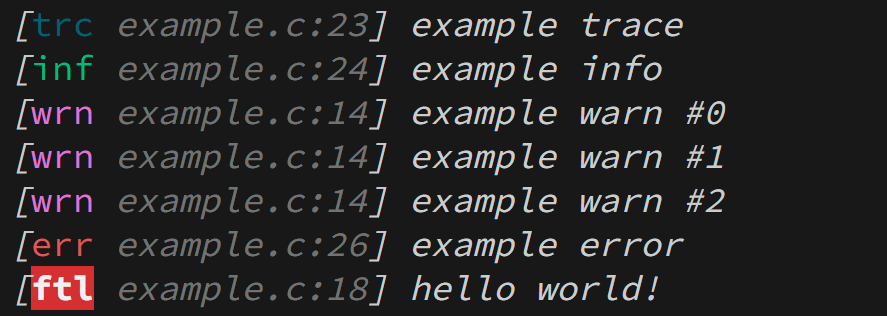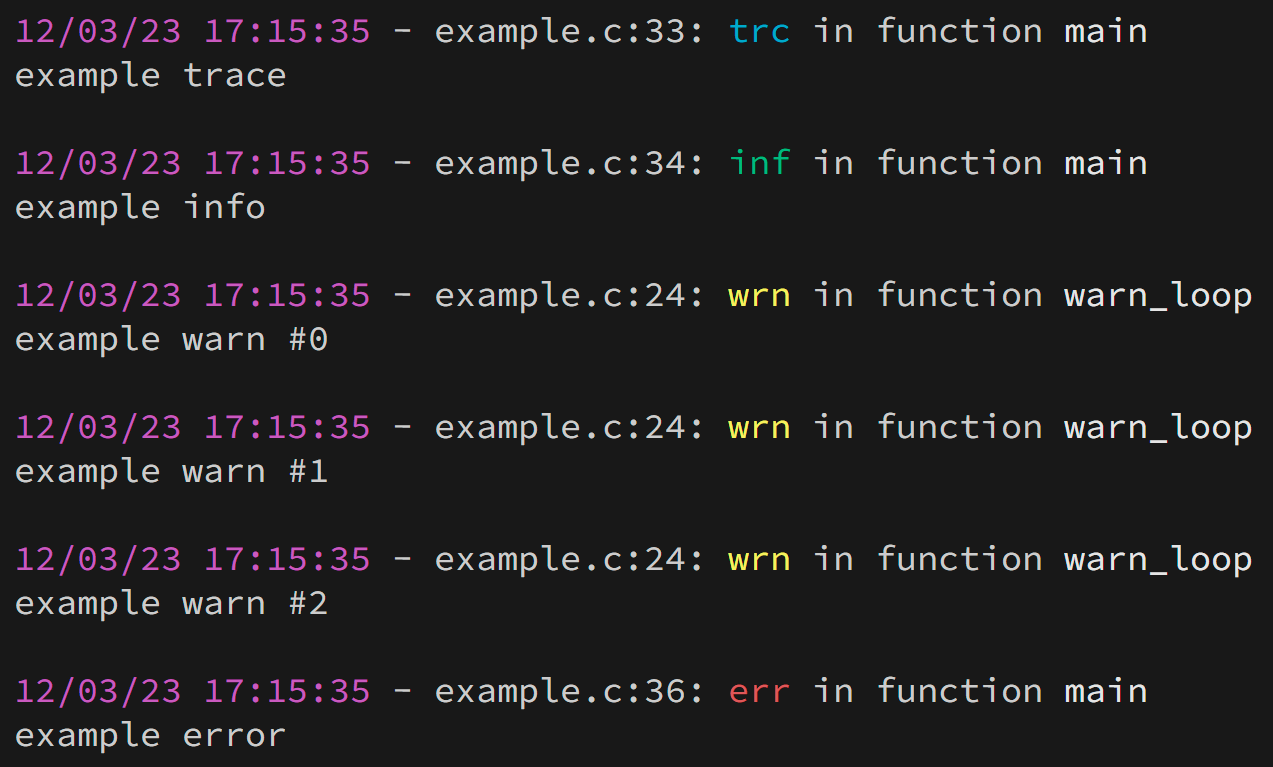(Almost) plain macro zero-dependency single-file library to get rid of boilerplate logging code although keep them pretty.
Default output looks like this (screen from VSCode terminal):
Although the library is customizable (refer to the section below).
// foo.c
// define this in your main file to allow MiLo to implement itself
#define MILO_IMPL
// ...other includes...
#define MILO_LVL MILO_LVL_TRACE
#include <milo.h>
void foo() {
trace("example trace");
info("example info");
for (int i = 0; i < 3; i++)
warn("example warn #%i", i);
error("example %s", "error");
fatal("%10s", "say hello! ignore");
}Available MILO_LVLs:
MILO_LVL_TRACE(aliasMILO_LVL_ALL)MILO_LVL_INFOMILO_LVL_WARNMILO_LVL_ERRORMILO_LVL_FATALMILO_LVL_NONE(aliasMILO_LVL_SILENT)
By default, the MILO_LVL is set to MILO_LVL_INFO, but you can modify it by redefining MILO_DEFAULT_LVL at the build level. More info on this is provided later.
It is possible to use different MILO_LVLs for different files, for example:
// bar.c
// ...other includes...
#include "foo.c" // example from above
// this two lines should be under all other incldes to prevent shadowing
#define MILO_LVL MILO_LVL_ERROR
#include <milo.h>
void bar() {
error("example error"); // will print an error
info("example nothing"); // won't do anything
foo(); // will print all messages as expected
}Because MiLo "functions" are actually function-like macros, they will always shadow variables and functions with the same name. MiLo provides a MILO_USE_SHORTCUTS definition to adress the situation. It is enabled by default, but can be changed if necessary:
#define MILO_USE_SHORTCUTS (0)
#define MILO_LVL MILO_LVL_WARN
#include <milo.h>
int check_unwanted_condition() {
int error = 0;
if (unwanted_condition) {
// now functions from MiLo are called like this
milo_error("unexpected unwanted condition!");
error = 1;
}
// ...
return error;
}Like MILO_LVL, this is separate for each instance of including the library.
There are quite a plenty of options to customize:
| definition | default value | description |
|---|---|---|
milo_printf(fmt, ...) |
printf(fmt, ...) |
Used in trace, info and warn |
milo_eprintf(fmt, ...) |
fprintf(stderr, fmt, ...) |
Used in error and fatal |
MILO_DEFAULT_LVL |
MILO_LVL_INFO |
Used if MILO_LVL is not defined |
MILO_NO_TA |
Disables text attributes | |
MILO_TA_TRACE |
clear all, blue | Text attribute for trace |
MILO_TA_INFO |
clear all, green | Text attribute for info |
MILO_TA_WARN |
clear all, bright yellow | Text attribute for warn |
MILO_TA_ERROR |
clear all, red | Text attribute for error |
MILO_TA_FATAL |
clear all, bold, red | Text attribute for fatal |
MILO_TA_FILE |
clear all, faded | Text attribute for filename |
MILO_TA_CLEAR |
clear all | Text attribute for everything else |
MILO_LVL_NAME_TRACE |
"trc" |
Log level name for trace |
MILO_LVL_NAME_INFO |
"inf" |
Log level name for info |
MILO_LVL_NAME_WARN |
"wrn" |
Log level name for warn |
MILO_LVL_NAME_ERROR |
"err" |
Log level name for error |
MILO_LVL_NAME_FATAL |
"ftl" |
Log level name for fatal |
MILO_PREFIX_FORMAT |
"(atcl)[{at}{lvl}(atcl) (atfile){file}:{line}(atcl)] " |
Default format for the log prefix |
milo_prefix_args(at, lvl) |
at, lvl, MILO_FILE, MILO_LINE |
Arguments for the log prefix |
MILO_TA_FILE,MILO_TA_CLEAR,MILO_PREFIX_FORMATandmilo_prefix_argsmust not include parentheses since they rely on string concatenation and other macro tricks.
MILO_TA_TRACE,MILO_TA_INFO,MILO_TA_WARN,MILO_TA_ERROR,MILO_TA_FATAL,MILO_TA_FILEandMILO_TA_CLEARare redefined together. If this group is defined,MILO_NO_TAhas no effect.
MILO_LVL_NAME_TRACE,MILO_LVL_NAME_INFO,MILO_LVL_NAME_WARN,MILO_LVL_NAME_ERROR,MILO_LVL_NAME_FATALare only redefined together.
If
milo_printfis defined, butmilo_eprintfis not, it will be the same asmilo_printf.
All definitions must be globally defined to ensure proper functionality. If they were at the library level, inconsistencies could arise when using multiple libraries within a single project. For example, let's capitalize and spell out level names completely:
# because this is bash, "FOO" becomes FOO in C, so we need additional quotes
gcc -o main main.c foo.c bar.c \
-D MILO_LVL_NAME_TRACE='"TRACE"' \
-D MILO_LVL_NAME_INFO='"INFO"' \
-D MILO_LVL_NAME_WARN='"WARN"' \
-D MILO_LVL_NAME_ERROR='"ERROR"' \
-D MILO_LVL_NAME_FATAL='"FATAL"'Writing a lot of definitions in build scripts is not very efficent, so MiLo provides another way of doing this: MILO_CONFIG macro. You only need to define it, all other settings go there.
// milo_config.h
#define MILO_TA_TRACE ("\033[0;2;36m") // made slightly faded
#define MILO_TA_INFO ("\033[0;32m") // default
#define MILO_TA_WARN ("\033[0;95m") // yellow changed to purple
#define MILO_TA_ERROR ("\033[0;31m") // default
#define MILO_TA_FATAL ("\033[0;1;41m") // color background instead of text
#define MILO_TA_FILE "\033[0;3;2m" // made italic
#define MILO_TA_CLEAR "\033[0;3m" // all text except level names and filenames made italicgcc -o main main.c foo.c bar.c -D MILO_CONFIG='"milo_config.h"'In both cases, this will look like this:
This part is not so obvious, so here is the small example:
// milo_config.h
// in reality, there may be a multiple definition error here except for some very
// simple projects. therefore, it should be sent to a .c file. After all, this is
// just an example
const char *milo_timestamp(const char *const fmt) {
static char buf[32] = {0};
static time_t t;
time(&t);
strftime(buf, 32, fmt, localtime(&t));
return buf;
}
// not really necessary, but makes this mess a bit prettier
#define MILO_TIME (milo_timestamp("%D %H:%M:%S"))
// be careful not to include parentheses in these two definitions, as they rely on string concatenation
#define MILO_PREFIX_FORMAT \
MILO_TA_CLEAR \
"\n" \
"\033[0;35m" /* custom TA for timestamp */ \
"%s" /* {timestamp} */ \
MILO_TA_CLEAR /* clear custom TA */ \
" - " \
"%s:%i: " /* {file}&{line} */ \
"%s" /* {attr} */ \
"%s" /* {lvl} */ \
MILO_TA_CLEAR /* clear TA */ \
" in function " \
"\033[0;37m" /* custom TA for function */ \
"%s" /* {function} */ \
MILO_TA_CLEAR /* clear custom TA */ \
"\n"
#define milo_prefix_args(attr, lvl) \
MILO_TIME, MILO_FILE, MILO_LINE, (attr), (lvl), MILO_FUNCThis will look like this:


